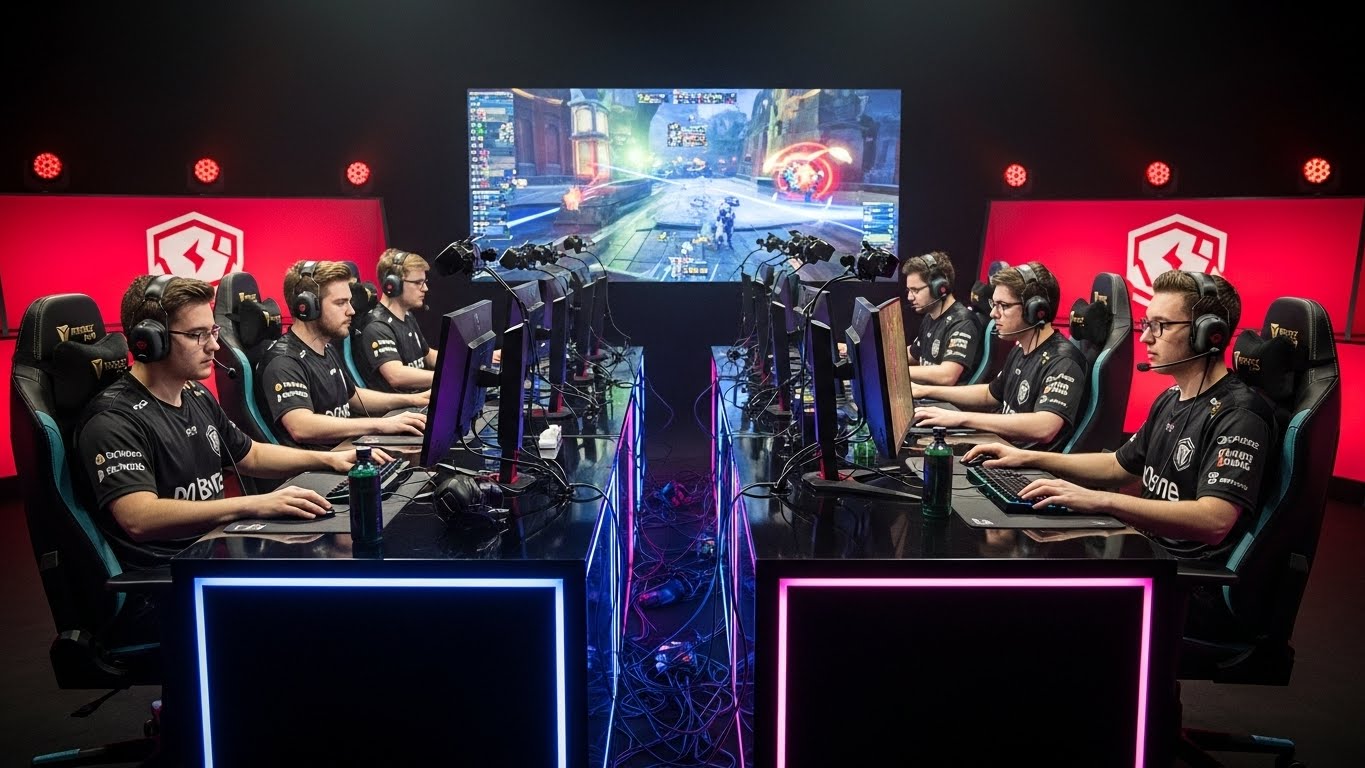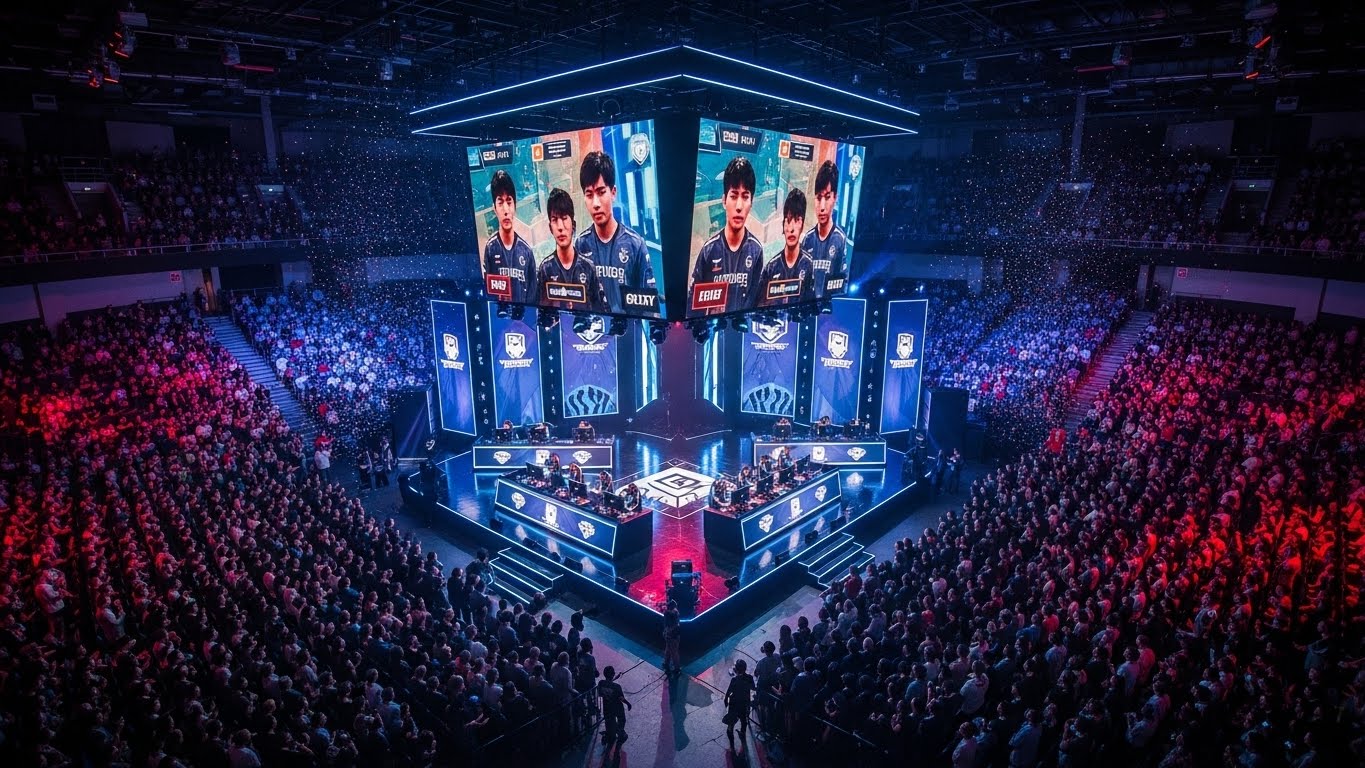Esports, short for electronic sports, has evolved from a niche pastime into a global entertainment powerhouse. What began as a hobby for passionate gamers has transformed into a billion-dollar industry, captivating millions of fans worldwide. Competitive gaming has become more than just a form of entertainment; it’s now a full-fledged sport with professional leagues, massive prize pools, and a dedicated fanbase that rivals traditional sports in terms of viewership and engagement.
In this blog post, we’ll dive into the world of esports, exploring its origins, growth, cultural impact, and the future that lies ahead. From the first competitive gaming tournaments to the professional leagues of today, esports has reshaped the way we think about gaming and its role in modern entertainment. Whether you’re an avid esports fan, a casual viewer, or someone new to the scene, this article will provide insight into why esports has become a cultural and economic force to be reckoned with.
The Early Days of Esports: A New Frontier
Esports, like many other modern phenomena, has humble beginnings. In the early 1970s and 1980s, the first video games emerged, and with them, the concept of competitive play. However, it wasn’t until the 1990s that the seeds of esports were planted. The first organized gaming competition took place in 1980 with the Space Invaders Championship, which was hosted by Atari. Though small in scale, this marked the first time that players were publicly competing for a prize in a video game.
As the internet began to take off in the 1990s, multiplayer games such as Quake, StarCraft, and Warcraft opened up new possibilities for competitive gaming. Players could now compete against one another across great distances, and this set the stage for the first true esports tournaments. These early competitions were often grassroots events, held in LAN (local area network) cafes or conventions. Yet, the appeal of these tournaments grew rapidly, and by the late 1990s and early 2000s, esports began to take shape as a legitimate form of competitive entertainment.
The Dawn of Esports Tournaments
In the early 2000s, esports gained significant momentum with the launch of major international tournaments like the World Cyber Games (WCG) and the Electronic Sports World Cup (ESWC). These events attracted top players from around the world and provided a platform for competitive gaming to be recognized on a global scale. The WCG, in particular, is often seen as the “Olympics of esports,” bringing together players from a variety of games to compete for the title of world champion.
Around the same time, the rise of online gaming platforms, such as Battle.net (the service behind Blizzard’s games) and Steam, helped to bring competitive gaming to a wider audience. The ability to play against opponents anywhere in the world created a global community of players eager to showcase their skills. The growth of online gaming, coupled with the increasing popularity of gaming as a spectator activity, helped lay the foundation for the esports industry we know today.
Esports Today: A Thriving Industry
Fast forward to the present, and esports has evolved into a full-fledged industry with a global following. Major events, such as the League of Legends World Championship, The International (for Dota 2), and CS:GO Major Championships, draw millions of viewers each year. These tournaments often have prize pools that reach into the millions of dollars, attracting top talent from across the globe. Esports is now a professionally recognized sport, with established leagues, franchises, and sponsorships that mirror the structure of traditional sports leagues.
Esports as a Professional Career
Esports has also opened the door for players to pursue gaming as a career. Professional gamers, coaches, analysts, and streamers now have the opportunity to make a living doing what they love. Successful players can sign multi-million-dollar sponsorship deals, secure lucrative prize earnings, and even enter into exclusive contracts with esports organizations. Just like in traditional sports, the best players are recognized as athletes and treated as celebrities.
Teams in games like League of Legends, Dota 2, and Counter-Strike: Global Offensive (CS:GO) compete in regional leagues, with the best teams advancing to international tournaments. These teams are backed by major organizations that invest in training facilities, coaching staff, and support staff to help players improve their performance. Esports organizations are now structured similarly to traditional sports teams, complete with management, marketing, and business operations.
Streaming has also become a major revenue stream for esports professionals. Platforms like Twitch, YouTube Gaming, and Facebook Gaming provide players with the opportunity to broadcast their gameplay live to millions of fans. Many top-tier players and streamers earn substantial income from advertising, sponsorships, and fan donations, creating a direct connection between players and their fanbase.
Esports Fanbase: A Global Community
One of the driving forces behind esports’ meteoric rise is its fanbase. Esports fans are highly engaged and passionate, creating a unique culture of their own. Unlike traditional sports fans who might attend live games in stadiums, esports fans typically watch tournaments via live streams on platforms like Twitch or YouTube. Some events, such as the League of Legends World Championship, have even filled entire arenas with fans cheering for their favorite teams.
The appeal of esports lies in the accessibility it offers to fans. Anyone with an internet connection can tune into a tournament, interact with fellow viewers, and engage in discussions with players and commentators. This has led to the creation of global esports communities where fans from different parts of the world can share their love of gaming, discuss strategies, and support their favorite players and teams.
Esports has also fostered a sense of connection that transcends borders. Fans from various countries can come together to cheer on players from different regions, creating a sense of unity and shared experience. Online communities, such as those on Reddit, Discord, and Twitter, allow fans to stay connected, share memes, and discuss matches, further strengthening the bond between players and fans.
The Role of Technology in Esports
The rapid development of gaming technology has played a crucial role in shaping the growth of esports. As gaming hardware, such as graphics cards, processors, and monitors, has become more powerful, the level of competition has intensified. Esports players are now competing on the cutting edge of technology, with some players using custom-built PCs optimized for high-performance gaming. The rise of high-refresh-rate monitors, low-latency peripherals, and cutting-edge graphics engines has helped to elevate esports to the level of professional sports in terms of precision and performance.
In addition to the hardware, advances in game design have contributed to the rise of esports. Developers now design games with competitive play in mind, ensuring that they are balanced, fair, and exciting to watch. Games like League of Legends, Dota 2, Overwatch, and Valorant are built with features that make them suitable for competitive play, with regular updates and patches designed to maintain a healthy, evolving competitive environment.
Esports organizations are also increasingly using technology to enhance the viewing experience. Broadcasts of esports events now feature advanced graphics, live statistics, and real-time analysis from experts, similar to the production values seen in traditional sports broadcasts. Some events even incorporate virtual reality (VR) and augmented reality (AR) elements to provide fans with a more immersive experience. These innovations have helped transform esports from a simple gaming competition into a professional spectacle with the production value and excitement that rivals traditional sports.
The Future of Esports: Expanding Boundaries
As esports continues to grow, the possibilities for its future are exciting and limitless. Esports is poised to become an even more integral part of global entertainment, and its potential impact is only beginning to be realized.
Integration with Traditional Sports
Esports has already started to blur the lines between traditional sports and digital competition. Some traditional sports organizations, such as the NBA and NFL, have invested in esports teams and leagues, recognizing the potential of competitive gaming as a mainstream entertainment medium. The NBA 2K League, for example, has created a platform for gamers to compete in the NBA 2K video game, while the FIFA eWorld Cup attracts top players from the FIFA series.
As traditional sports leagues continue to embrace esports, it’s likely we’ll see further integration, with crossover events, hybrid competitions, and more widespread acceptance of esports as a legitimate sport. In the future, esports may even become part of major international sporting events, such as the Olympics, bringing competitive gaming to a global stage.
Expansion into New Games and Platforms
The esports ecosystem is also expanding to new games and platforms. While games like League of Legends and Dota 2 dominate the competitive scene, new titles like Valorant and Apex Legends have quickly gained traction. As new genres and games emerge, esports will continue to diversify, with competitions held for a wide range of games across multiple platforms, from consoles to mobile devices.
Mobile esports, in particular, is seeing explosive growth in regions like Asia, where games such as PUBG Mobile and Mobile Legends have garnered massive followings. As mobile technology continues to improve, it’s likely that esports will become even more accessible, allowing a broader audience to participate in and watch competitive gaming events.
A Global Cultural Phenomenon
Ultimately, esports is more than just a competitive activity—it’s a cultural phenomenon. The integration of esports into mainstream entertainment, the rise of global tournaments, and the growing professionalization of players have all contributed to the recognition of esports as a legitimate form of competition. As esports continues to evolve, it will likely continue to shape the way we view sports, entertainment, and even technology.



